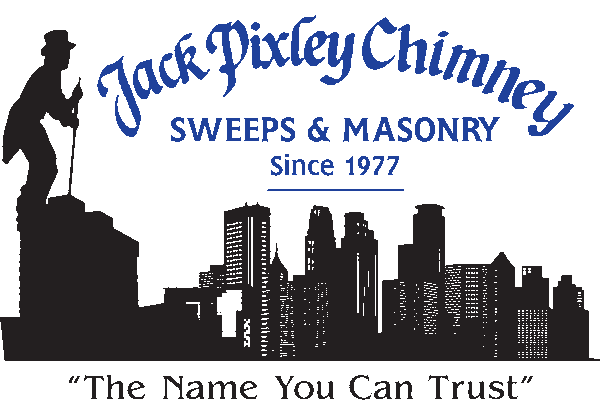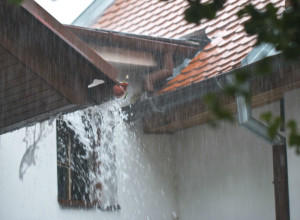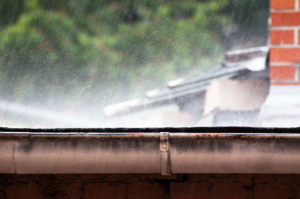While a little water in your fireplace might seem like only a minor inconvenience, it can spell major trouble for your chimney system. Whether it’s a few droplets, a large puddle, or even a musty smell, the presence of water in your fireplace and chimney can cause damage to many different chimney components.
Causes of leaky chimneys
Because chimneys are complex structures with a number of different components, there is no one guaranteed cause of a leaky chimney. However, there are several common ways that water can get in; below are four of the most common causes of chimney leaks.
- Chimney cap: Chimney caps are metal covers that protect the top of the flue and keep animals, debris, and moisture out of the chimney. If a chimney cap is installed incorrectly, does not fit properly, or is damaged, water can easily enter the flue and chimney.
- Chimney crown: The chimney crown is the mortar slab that covers and seals the top of the chimney. Well-built chimney crowns are typically made of concrete or other stone to prevent the chips and cracks associated with long term exposure to the elements. Likewise, a good chimney crown should have overhangs and be slightly sloped in order to prevent water from pooling or draining directly onto the masonry of the chimney.
- Damaged masonry: Damage caused by water can cause bricks to crack and spall; not only does this let additional water into the fireplace system, but it can also affect the structural stability of the chimney structure.
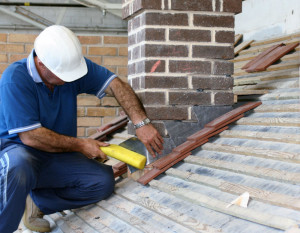
- Flashing: Chimney flashing are the layered metal strips that seal the joint between the roof and the chimney structure. Flashing can lose its watertight seal due to exposure to the elements, incorrect installation, damage from storms, or if changes to the roof line are made.
Repairing a leaky chimney
The first step to fixing a leaky chimney is to identify and repair the underlying cause of the leak. A chimney inspection done by a certified chimney sweep is often the best way to uncover where water is getting into the chimney system; by fixing how the water is getting in first, you can avoid needing the same chimney repairs because of water damage again and again.
In addition to repairing your leaky chimney, preventative maintenance can be done to protect your chimney against water damage. Waterproofing is one of the best ways to protect your masonry against water entry. Our professional-grade SaverSystems sealants are specially designed to work on masonry; these sealants allow the masonry to retain its semi-porous nature, allowing gasses to pass through but preventing moisture from getting in. Water repellent sealants can even be used if your masonry already has areas of water damage!
If you have a leaky chimney, it is important to have it repaired as soon as possible. Contact the experts at Jack Pixley Sweeps today for more information on how we can fix your leaky chimney!
When it comes to the weather, the old adage is true – April showers do bring May flowers! Unfortunately, spring showers can do more than just revitalize your garden after a long winter; they can also cause chimney damage. Water damage is often the primary cause of chimney deterioration. However, homeowners don’t have to sit idly by and watch the elements destroy their chimney. Instead, fight back against water damage by having your chimney waterproofed.
How water damages your chimney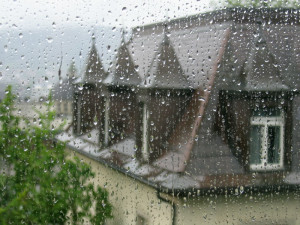
Although they are built to stand up to the elements, water is one of the most damaging forces to any chimney or masonry structure. Because bricks are naturally porous – which makes them the ideal building material for chimneys – they can absorb small amounts of water. Over time, this water can cause the masonry to crack, chip, or spall; this damage is often made worse by winter weather because of the freeze/thaw cycle.
The masonry damage caused by water entry is more than just an aesthetic problem. Damaged masonry can cause problems throughout your fireplace system, including chimney leaks. A chimney leak caused by cracked or spalled bricks can damage the surrounding masonry and building materials as well as other fireplace components. Dampness in the flue or firebox, water damage to roofs and walls surrounding the chimney, or cracked or missing bricks can all be signs of damaged masonry causing a chimney leak.
Protect your masonry through waterproofing
To protect your chimney from water damage caused by spring rains, consider having your masonry waterproofed. Waterproofing is preventative maintenance that can best protect your masonry against damage caused by water from rain, snow, ice, sprinklers, hoses, and other sources.
Our waterproofing products
When it comes to waterproofing your chimney, using the right products matters. In order to allow the masonry to retain its porous nature, special chimney-specific products should be used. At Jack Pixley Sweeps, we use and recommend three products by SaverSystems to our customers: ChimneySaver, CrownCoat, and FlashSeal.
- ChimneySaver: ChimneySaver is one of the longest-lasting water repellents available for chimneys. It can penetrate as deep as ¼ inch in most areas of the chimney, creating a strong bond with the masonry that will keep water out of years to come.
- CrownCoat: CrownCoat is a waterproof sealant designed for chimney crowns or washes. CrownCoat bonds with the cement of the chimney crown, protecting it from water entry and further damage to the concrete. CrownCoat also comes with a 15 year warranty against water intrustion.
- FlashSeal: FlashSeal is a rubber membrane that can be applied over your existing flashing to seal it against water entry. This is extremely important as faulty flashing is one of the main sources of chimney leaks. FlashSeal can reinforce existing flashing and is guaranteed to last up to seven years when correctly installed.
This year, don’t let spring rains damage your chimney; instead, protect your masonry by having it waterproofed. For those in the Minneapolis area, contact Jack Pixley Sweeps today for more information on our waterproofing services and to schedule your next appointment!
During the hot spring and summer months, most homeowners pay little attention to their chimneys. However, now is the best time to have your chimney maintenance and repairs done, especially if your chimney is in need of masonry repairs.
During the winter, fireplaces and chimneys endure months of heavy use and abuse. Coupled with exposure to freezing temperatures and other winter conditions, most chimney systems are in need of maintenance at the end of the season.
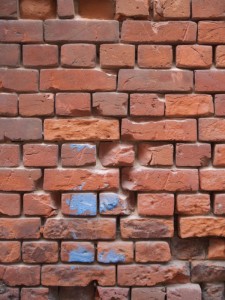 If your chimney or fireplace needs masonry repairs, now is the perfect time to have them done!
If your chimney or fireplace needs masonry repairs, now is the perfect time to have them done!
How masonry gets damaged
There are a number of ways that your chimney’s masonry may be damaged. Below are some of the most common causes of masonry damage.
Water: Moisture is one of the most damaging forces to your chimney and fireplace. While bricks and mortar are designed to stand up against water, repetitive damage from rain or leaks can cause masonry to crack or spall. The masonry in the firebox is particularly susceptible to water damage from chimney leaks; these bricks are designed to withstand high heats, not exposure to water.
Settling: All homes settle over time. However, if your fireplace was not built on a proper foundation this can cause it to crack or shift. Masonry damage from settling is often seen as cracks in the firebox or tilting or uneven chimneys. Chimneys that have been damaged by settling should be repaired as soon as possible to ensure they are stable and safe.
Other damage: While masonry is sturdy, it can be easily damaged if not correctly cared for. One cause of masonry damage that homeowners often forget about is power washing. Attempting to clean your chimney with a power washer can leave your bricks chipped, cracked, spalled, and in need of repair. Similarly, non-breathable sealants or paints that are not designed for use on masonry can actually further damage your chimney instead of protecting it.
Why have your masonry repaired now
Masonry damaged should ideally be repaired as soon as it is found. If you have existing or ongoing masonry damage, however, the summer is a great time of year to have your masonry repaired. Below are three reasons to have your masonry repaired before the fall.
1. Less fireplace use: As the temperatures outside climb, most homeowners are less likely to want to use their fireplaces. Because of this, you would not be inconvenienced or unable to use your fireplace when wanted when having it repaired now as to in the summer.
2. Fewer weather delays: Masonry repairs during the fall are often delayed by weather issues. Likewise, some masonry repairs cannot be performed in cooler temperatures, making them difficult – if not impossible – to complete in the fall or winter.
3. Less wait time: The fall is the most popular time of year for chimney maintenance and repairs. Because of this, it can be extremely difficult to get an appointment at a convenient time. Having your masonry repaired in the summer allows you to schedule the appointment when you want it rather than waiting weeks for an available time.
If you have masonry repairs that need to get done, don’t wait until fall. Let our expert masons take care of your chimney so it is ready to use when the temperatures drop. Call Jack Pixley Sweeps at 763-422-0481 today to schedule your masonry appointment!
